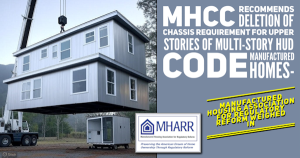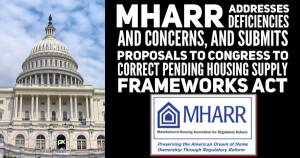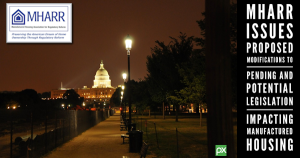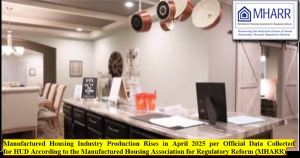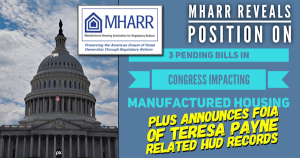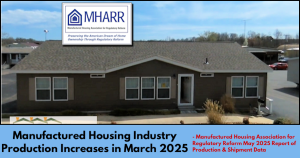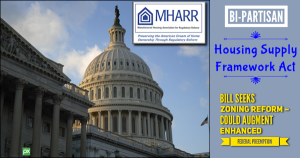MHARR Targets Fannie and Freddie Chattel Manufactured Home Lending Failure in DTS “Listening Session” Comments
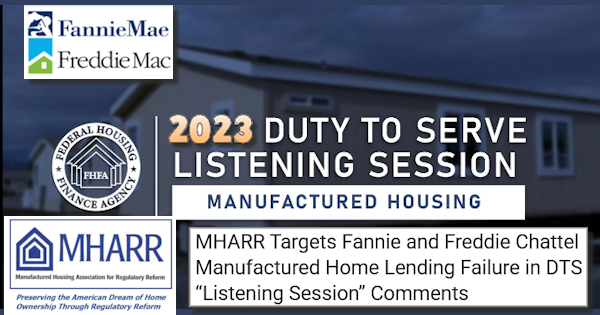

VIA FEDERAL EXPRESS
Federal Housing Finance Agency
Duty to Serve Markets
Office of Housing and Community Investments
Constitution Center
400 7th Street, S.W.
Washington, D.C. 20710
Re: July 18, 2023 FHFA Listening Session – Duty to Serve Underserved Markets – Manufactured Housing Market
Dear Sir or Madam:
The following comments are submitted on behalf of the Manufactured Housing Association for Regulatory Reform (MHARR). MHARR, which is based in Washington, D.C., represents independent producers of manufactured housing regulated under federal law by the U.S. Department of Housing and Urban Development (HUD). MHARR’s member companies are located in and produce homes that are sold in all regions of the United States.
Manufactured homes are specifically recognized – and protected – under federal law as a source of inherently-affordable homeownership, and are regulated under a system that is expressly designed to maintain their affordability in a manner that is also consistent with both quality and consumer safety.
Unfortunately, this marks, at least the fifth time that MHARR has addressed one of these Duty to Serve (DTS) “listening sessions.” It is “unfortunate” because DTS should have already been fully implemented within the manufactured housing market by now.
Instead of highlighting the glaring deficiencies and full-blown defiance of Congress and the law by Fannie Mae and Freddie Mac within the HUD Code market, and the Enterprises’ failure to serve, at all, the vast bulk of its consumers, we should instead be here talking about the success of DTS and talking about how DTS-based lending helped to ease the nation’s affordable housing crisis.
Fifteen years later, however, that is not the case and it appears that the entire matter is at an impasse. Whether Fannie and Freddie (or FHFA for that matter) like it or not, the vast bulk of new HUD Code manufactured homes – close to 80% on an ongoing basis per U.S. Census Bureau data– are financed through chattel, or personal property loans.
Financing a manufactured home as chattel may not be the preferred choice of Fannie or Freddie (or even FHFA). But it IS — and has been — the preferred choice of millions of American consumers. And the data is remarkably consistent over time. Going back ten years or more, the census data shows the percentage of chattel loans to all new manufactured home purchase loans fluctuating within a very narrow range, just under 80%.
Why? Chattel loans admittedly carry a higher interest rate than real estate mortgage loans. That is not news, even though its routinely bandied about as if it is. But there is more involved than just the interest rate, obviously. For one, adding the cost of real estate to the purchase transaction makes it far more costly in absolute dollar terms than a home-only chattel loan. That might not seem like a big deal to someone versed only in the site-built market, but in the highly price-sensitive manufactured housing market, it is.
As the nation’s premier source of affordable homeownership – as specifically recognized by federal law – manufactured housing serves a market that is largely comprised of lower and moderate-income Americans. At these lower income levels, the manufactured housing financing market is highly elastic. At such marginal income levels, small differences in the financed price of the home can exclude significant numbers of potential purchasers from the market. As a result, home-only chattel loans that do not include financing for the cost of the land on which the home is sited, are an attractive option for many purchasers.
There is also the issue of loan duration, with chattel loans typically providing for a shorter pay-back period than most mortgages, that may be more consistent with the needs and wishes of younger singles and families, as well as senior citizens.
In any event, though, the reality of the manufactured housing market – whether Fannie and Freddie (or FHFA) like it or not – is that chattel lending predominates and has predominated for many years.
That is the reality and Congress’ directive to Fannie, Freddie and FHFA, through DTS, was to serve that reality – to serve the HUD Code market as it actually exists, not as they or some others would like to see it in some ideal world that has never, in fact, been known to exist.
We are now 15 years down the road since the enactment of DTS and still, nearly 80% of the manufactured housing market remains completely unserved. That is the key fact. Everything else is window dressing and distraction.
This is unacceptable. It is also contrary to the clear objectives of Congress, which expressly included chattel loans with the scope of DTS. The time for excuses and toe-dipping is over. The time for more “research” while the manufactured housing market precipitously declines (over 30% since the 3rd Quarter of 2022) is over.
The time for concrete action – in the near-term – and not years from now, to provide market-significant levels of securitization and secondary market support for manufactured housing consumer chattel loans is here.
Consumers are hurting, the industry is hurting, and the nation is hurting from a lack of truly affordable homeownership. Now is the time for bold leadership from FHFA.
Otherwise, this matter will have to go back to Congress for clarification that DTS means and intends support for manufactured housing chattel loans in market-significant numbers, now.
Sincerely,
Mark Weiss President/CEO
cc: Hon. Sandra Thompson
Hon. Marcia Fudge
Hon. Sherrod Brown
Hon. Tim Scott
Hon. Warren Davidson
Hon. Emanuel Cleaver
Manufactured Housing Association for Regulatory Reform (MHARR)
1331 Pennsylvania Ave N.W., Suite 512
Washington D.C. 20004
Phone: 202/783-4087
Fax: 202/783-4075
Email: MHARR@MHARRPUBLICATIONS.COM
Website: www.manufacturedhousingassociation.org

VIA FEDERAL EXPRESS
Federal Housing Finance Agency
Duty to Serve Markets
Office of Housing and Community Investments
Constitution Center
400 7th Street, S.W.
Washington, D.C. 20710
Re: July 18, 2023 FHFA Listening Session – Duty to Serve Underserved Markets – Manufactured Housing Market
Dear Sir or Madam:
The following comments are submitted on behalf of the Manufactured Housing Association for Regulatory Reform (MHARR). MHARR, which is based in Washington, D.C., represents independent producers of manufactured housing regulated under federal law by the U.S. Department of Housing and Urban Development (HUD). MHARR’s member companies are located in and produce homes that are sold in all regions of the United States.
Manufactured homes are specifically recognized – and protected – under federal law as a source of inherently-affordable homeownership, and are regulated under a system that is expressly designed to maintain their affordability in a manner that is also consistent with both quality and consumer safety.
Unfortunately, this marks, at least the fifth time that MHARR has addressed one of these Duty to Serve (DTS) “listening sessions.” It is “unfortunate” because DTS should have already been fully implemented within the manufactured housing market by now.
Instead of highlighting the glaring deficiencies and full-blown defiance of Congress and the law by Fannie Mae and Freddie Mac within the HUD Code market, and the Enterprises’ failure to serve, at all, the vast bulk of its consumers, we should instead be here talking about the success of DTS and talking about how DTS-based lending helped to ease the nation’s affordable housing crisis.
Fifteen years later, however, that is not the case and it appears that the entire matter is at an impasse. Whether Fannie and Freddie (or FHFA for that matter) like it or not, the vast bulk of new HUD Code manufactured homes – close to 80% on an ongoing basis per U.S. Census Bureau data– are financed through chattel, or personal property loans.
Financing a manufactured home as chattel may not be the preferred choice of Fannie or Freddie (or even FHFA). But it IS — and has been — the preferred choice of millions of American consumers. And the data is remarkably consistent over time. Going back ten years or more, the census data shows the percentage of chattel loans to all new manufactured home purchase loans fluctuating within a very narrow range, just under 80%.
Why? Chattel loans admittedly carry a higher interest rate than real estate mortgage loans. That is not news, even though its routinely bandied about as if it is. But there is more involved than just the interest rate, obviously. For one, adding the cost of real estate to the purchase transaction makes it far more costly in absolute dollar terms than a home-only chattel loan. That might not seem like a big deal to someone versed only in the site-built market, but in the highly price-sensitive manufactured housing market, it is.
As the nation’s premier source of affordable homeownership – as specifically recognized by federal law – manufactured housing serves a market that is largely comprised of lower and moderate-income Americans. At these lower income levels, the manufactured housing financing market is highly elastic. At such marginal income levels, small differences in the financed price of the home can exclude significant numbers of potential purchasers from the market. As a result, home-only chattel loans that do not include financing for the cost of the land on which the home is sited, are an attractive option for many purchasers.
There is also the issue of loan duration, with chattel loans typically providing for a shorter pay-back period than most mortgages, that may be more consistent with the needs and wishes of younger singles and families, as well as senior citizens.
In any event, though, the reality of the manufactured housing market – whether Fannie and Freddie (or FHFA) like it or not – is that chattel lending predominates and has predominated for many years.
That is the reality and Congress’ directive to Fannie, Freddie and FHFA, through DTS, was to serve that reality – to serve the HUD Code market as it actually exists, not as they or some others would like to see it in some ideal world that has never, in fact, been known to exist.
We are now 15 years down the road since the enactment of DTS and still, nearly 80% of the manufactured housing market remains completely unserved. That is the key fact. Everything else is window dressing and distraction.
This is unacceptable. It is also contrary to the clear objectives of Congress, which expressly included chattel loans with the scope of DTS. The time for excuses and toe-dipping is over. The time for more “research” while the manufactured housing market precipitously declines (over 30% since the 3rd Quarter of 2022) is over.
The time for concrete action – in the near-term – and not years from now, to provide market-significant levels of securitization and secondary market support for manufactured housing consumer chattel loans is here.
Consumers are hurting, the industry is hurting, and the nation is hurting from a lack of truly affordable homeownership. Now is the time for bold leadership from FHFA.
Otherwise, this matter will have to go back to Congress for clarification that DTS means and intends support for manufactured housing chattel loans in market-significant numbers, now.
Sincerely,
Mark Weiss President/CEO
cc: Hon. Sandra Thompson
Hon. Marcia Fudge
Hon. Sherrod Brown
Hon. Tim Scott
Hon. Warren Davidson
Hon. Emanuel Cleaver
Manufactured Housing Association for Regulatory Reform (MHARR)
1331 Pennsylvania Ave N.W., Suite 512
Washington D.C. 20004
Phone: 202/783-4087
Fax: 202/783-4075
Email: MHARR@MHARRPUBLICATIONS.COM
Website: www.manufacturedhousingassociation.org




